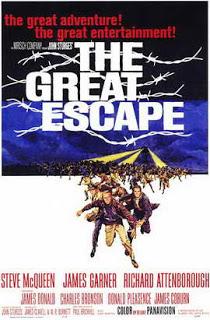
Directed By: John Sturges
Starring: Steve McQueen, James Garner, Richard Attenborough
Tagline: "From a barbed-wire camp- to a barbed-wire country!"
Trivia: Donald Pleasence had actually been a Royal Air Force pilot in World War II, who was shot down, became a prisoner of war and was tortured by the Germans
Hoping to lure American audiences away from their television sets, Hollywood produced an inordinate number of “big” movies throughout the 1950’s and ‘60s, epics that boasted larger-than-life characters, exotic settings, a huge stable of stars, and running times that approached (and occasionally exceeded) the 3-hour mark.
Focusing primarily on biblical and historical epics at the outset, the studios soon applied this new way of doing things to other genres as well, including the war film. Fresh on the heels of 1961’s The Guns of Navarone and ‘62s The Longest Day, both of which featured an enormous cast, plenty of heart-pounding action, and some top-notch battle sequences, director John Sturges and his crew took the real-life story of a mass escape from a World War II German POW camp and turned it into yet another large-scale motion picture.
And while it doesn’t have as many action-oriented scenes as either The Guns of Navarone or The Longest Day, 1963’s The Great Escape is every bit as thrilling as its two predecessors.
In an effort to prevent further escapes, The German Luftwaffe builds a brand new high-security POW camp, and then fills it with their most uncooperative prisoners, enemy flyboys who have repeatedly tried to burrow and climb their way to freedom. One in particular, American pilot Captain Hilts (Steve McQueen), has made 17 escape attempts in the past, while British Squadron Leader Bartlett (Richard Attenborough) has masterminded several big-scale breakouts. In fact, Bartlett has become such a thorn in the Germans’ side that the Gestapo has promised to execute him on the spot if he tries to escape again.
But such threats mean nothing to Bartlett, who intends to put the Nazi’s new camp to the test by staging the biggest escape he’s ever attempted: 250 men at once! With plans to dig three tunnels simultaneously (nicknamed “Tom”, “Dick”, and “Harry”), Bartlett knows that, if he’s going to pull off this seemingly impossible feat, he’ll need all the help he can get.
To this end, he enlists the aid of a number of his compatriots, including flight Lt. Hendley (James Garner), who can track down the materials they’ll need; Lt. Velinski (Charles Bronson), aka the “Tunnel King”, who has already dug his way out of numerous camps; Lt. Blythe (Donald Pleasance), a master forger; Lt. Ashley-Pitt (David McCallum), assigned the task of getting rid of the dirt that’s sure to pile up once the digging starts; and Australian officer Sedgwick (James Coburn), who, among other things, constructs an air pump that will allow those working in the tunnels to remain down there for hours on end. As for Captain Hilts, who has already tried to escape several times on his own (each attempt earning him a stint in solitary confinement), he initially balks at the idea of a mass break-out, but figures he has nothing to lose by pitching in and helping any way he can.
After months of preparation, the Allied prisoners are more than ready to leave their Nazi captors behind. But even if Bartlett does manage to sneak out 250 men under the cover of darkness, how many will actually make it to the border before they’re recaptured?
Though set primarily inside a POW camp, The Great Escape is still one hell of an action/adventure film. Not 20 minutes after they’ve arrived at the new camp, a half dozen prisoners, including Velinski and Sedgwick, try to escape, while Hilts, who tests the guard towers by crossing into a restricted area, earns himself 20 days in the cooler, a sentence passed by commandant Von Luger (Hannes Messemer) himself.
Of course, the real excitement comes in the final act (the escape itself), but even in the early scenes dedicated to putting Bartllett’s plan into motion, director Sturges and his writers, James Clavell and W.R. Burnett, maintain a consistent level of tension throughout. Along with the constant fear that the Germans might stumble upon one of the tunnels during a routine inspection, there are the personal dramas that keep our eyes glued to the screen, such as the revelation that Velinski suffers from claustrophobia, or that Blythe’s deteriorating eyesight may force Bartlett and the others to leave him behind.
It is moments such as these, handled wonderfully by the movie’s all-star cast, that make The Great Escape so intriguing, and the camaraderie that builds among its characters ensures we’re rooting for these guys every step of the way. So while it’s true that other war films have more action than The Great Escape, very few are as much fun to watch.
